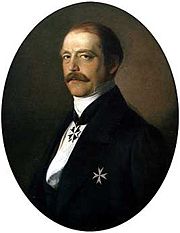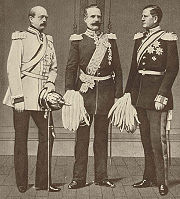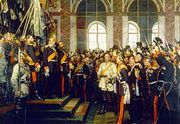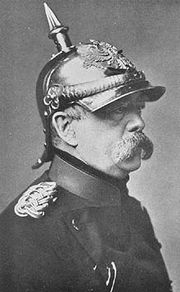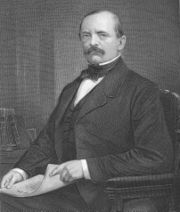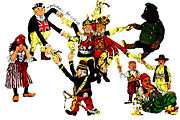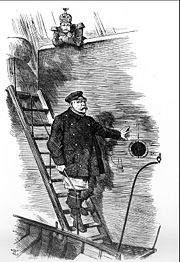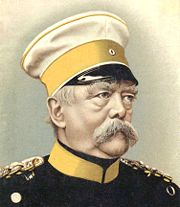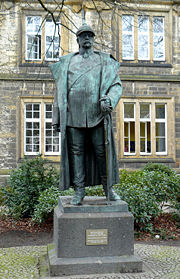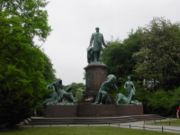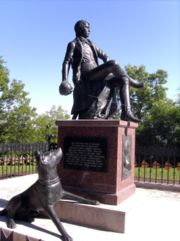Otto von Bismarck
2008/9 Schools Wikipedia Selection. Related subjects: Historical figures
| Otto von Bismarck | |
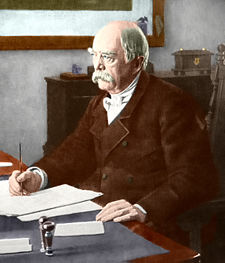 Otto von Bismarck in his study in 1886. |
|
|
1st Chancellor of Germany
|
|
|---|---|
| In office 21 March 1871 – 20 March 1890 |
|
| Monarch | William I Frederick III William II |
| Succeeded by | Leo von Caprivi |
|
Minister-President of Prussia
|
|
| In office 23 September 1862 – 1 January 1873 |
|
| Preceded by | Adolf zu Hohenlohe-Ingelfingen |
| Succeeded by | Albrecht von Roon |
| In office 9 November 1873 – 20 March 1890 |
|
| Preceded by | Albrecht von Roon |
| Succeeded by | Leo von Caprivi |
|
|
|
| Born | 1 April 1815 Schönhausen, Prussia |
| Died | 30 July 1898 (aged 83) Friedrichsruh, Germany |
| Political party | None |
| Spouse | Johanna von Puttkamer |
| Signature |  |
Otto Eduard Leopold von Bismarck, Count of Bismarck-Schönhausen, Duke of Lauenburg, Prince of Bismarck (born April 1, 1815 in Schönhausen, today Saxony-Anhalt; died July 30, 1898 in Friedrichsruh near Hamburg), was a Prussian and German statesman of the 19th century. As Minister-President of Prussia from 1862–90, he oversaw the unification of Germany. From 1867 on, he was Chancellor of the North German Confederation. When the second German Empire was formed in 1871, he served as its first Chancellor, gaining the nickname "Iron Chancellor". As Chancellor, Bismarck held an important role in German government and greatly influenced German politics during his time of service.
Early life
Bismarck was born in Schönhausen, the wealthy family estate situated west of Berlin in the Prussian Province of Saxony. His father, Karl Wilhelm Ferdinand von Bismarck (Schönhausen, November 13, 1771 - November 22, 1845), was a landowner and a former Prussian military officer; his mother, Wilhelmine Luise Mencken ( Potsdam, February 24, 1789 - Berlin), the educated daughter of a politician. A.J.P. Taylor later remarked on the importance of this dual heritage: although Bismarck physically resembled his father, and appeared as a Prussian Junker to the outside world - an image which he often encouraged by wearing military uniform, even though he was not a regular officer - he was also more cosmopolitan and highly educated than was normal for men of such background. He was fluent in English, and as a young man would often quote Shakespeare or Byron in letters to his wife.
Bismarck was educated at the Friedrich-Wilhelm and the Graues Kloster-Gymnasium. Thereafter, at the age of seventeen, he joined the Georg August University of Göttingen, where he spent only a year as a member of the Corps Hannovera before enrolling in the Friedrich Wilhelm University of Berlin.
Whilst at Göttingen university, he had become the lifelong friend of an American student John Lothrop Motley, who described Bismarck as Otto v. Rabenmark in his novel Morton's Hope, or the Memoirs of a Provincial (1839). Motley was later an eminent historian.
Although Bismarck hoped to become a diplomat, he could only obtain minor administrative positions in Aachen and Potsdam, and soon resigned, having first placed his career in jeopardy by taking unauthorised leave to pursue two English girls, first Laura Russell, niece of the Duke of Cleveland, and then Isabella Loraine-Smith, daughter of a wealthy clergyman. He did not succeed in marrying either. He also served in the army for a year and became an officer in the Landwehr (reserve), before returning to run the family estates at Schönhausen on his mother's death in his mid-twenties.
Round about the age of thirty Bismarck had an intense friendship with Marie von Thadden, newly-married to a friend of his. Under her influence, he became a Pietist Lutheran, and later recorded that at Marie's deathbed (from typhoid) he prayed for the first time since his childhood. Bismarck married Marie's cousin, the noblewoman Johanna von Puttkamer (Viartlum, April 11, 1824 - Varzin, November 27, 1894) at Alt-Kolziglow on July 28, 1847. Their long and happy marriage produced one daughter (Marie) and two sons ( Herbert and Wilhelm, known as "Bill"), all of whom survived into adulthood. Johanna was a shy, retiring and deeply religious woman - although famed for her sharp tongue in later life - and in his public life Bimarck was sometimes accompanied by his sister Malwine ("Malle") von Arnim.
Whilst on holiday alone in Biarritz in the summer of 1862 (prior to becoming Prime Minister of Prussia), Bismarck would later have a romantic liaison with Kathy Orlov, the twenty-two year old wife of a Russian diplomat - it is not known whether or not their relationship was sexual. Bismarck kept his wife informed of his new friendship by letter, and in a subsequent year Kathy broke off plans to meet Bismarck on holiday again on learning that his wife and family would be accompanying him this time. They continued to write to one another until Kathy's premature death in 1874.
Early political career
In the year of his marriage, 1847, at age 32, Bismarck was chosen as a representative to the newly created Prussian legislature, the Vereinigter Landtag. There, he gained a reputation as a royalist and reactionary politician with a gift for stinging rhetoric; he openly advocated the idea that the monarch had a divine right to rule. His election was arranged by the Gerlach brothers, who were also Pietist Lutherans and whose ultra-conservative faction was known as the "Kreuzzeitung" after their newspaper, which featured an Iron Cross on its cover.
In March 1848, Prussia faced a revolution (one of the revolutions of 1848 in various European nations), which completely overwhelmed King Frederick William IV. The monarch, though initially inclined to use armed forces to suppress the rebellion, ultimately declined to leave Berlin for the safety of military headquarters at Potsdam (Bismarck later recorded that there had been a "rattling of sabres in their scabbards" from Prussian officers when they learned that the King would not suppress the revolution by force). He offered numerous concessions to the liberals: he wore the red-yellow-and black revolutionary colours (as seen on the flag of today's democratic Germany), promised to promulgate a constitution, agreed that Prussia and other German states should merge into a single nation, and appointed a liberal, Ludolf Cam, as Minister-President.
Bismarck had at first tried to rouse the peasants of his estate into an army to march on Berlin in the King's name. He travelled to Berlin in disguise to offer his services, but was instead told to make himself useful by arranging food supplies for the Army from his estates in case they were needed. The King's brother Prince William (the future King and Emperor William I) had fled to England, and Bismarck intrigued with William's wife Augusta to place their teenage son (the future Frederick III) on the Prussian throne in King Frederick William IV's place - Augusta would have none of it, and detested Bismarck thereafter, although Bismarck did later help to restore a working relationship between the King and his brother, who were on poor terms. Bismarck was not a member of the Landtag elected that year. But the liberal victory perished by the end of the year. The movement became weak due to internal fighting, while the conservatives regrouped, formed an inner group of advisers - including the Gerlach brothers - known as the "Camarilla" around the King, and retook control of Berlin. Although a constitution was granted, its provisions fell far short of the demands of the revolutionaries.
In 1849, Bismarck was elected to the Landtag, the lower house of the new Prussian legislature. At this stage in his career, he opposed the unification of Germany, arguing that Prussia would lose its independence in the process. He accepted his appointment as one of Prussia's representatives at the Erfurt Parliament, an assembly of German states that met to discuss plans for union, but only in order to oppose that body's proposals more effectively. The Parliament failed to bring about unification, for it lacked the support of the two most important German states, Prussia and Austria. In 1850, after a dispute over Hesse, Prussia was humiliated and forced to back down by Austria (supported by Russia) in the so-called Punctation of Olmutz; a plan for the unification of Germany under Prussian leadership, proposed by Prussia's Prime Ministers Radowitz, was also abandoned.
In 1851, Frederick William appointed Bismarck as Prussia's envoy to the Diet of the German Confederation in Frankfurt. Bismarck gave up his elected seat in the Landtag, but was appointed to the Prussian House of Lords a few years later. In Frankfurt he engaged in a battle of wills with the Austrian representative Count Thun, insisting on being treated as an equal by petty tactics such as insisting on doing the same when Thun claimed the privileges of smoking and removing his jacket in meetings.
Bismarck's eight years in Frankfurt were marked by changes in his political opinions, detailed in the numerous lengthy memoranda which he sent to his ministerial superiors in Berlin. No longer under the influence of his ultraconservative Prussian friends, Bismarck became less reactionary and more pragmatic. He became convinced that in order to countervail Austria's newly-restored influence, Prussia would not only have to ally herself with other German states - thus, he grew more accepting of the notion of a united German nation - but also maintain the friendship of Russia and a working relationship with Napoleon III's France - the latter being anathema to his conservative friends the Gerlachs, but necessary both to threaten Austria and to prevent France allying herself to Russia. In a famous letter to Leopold von Gerlach, Bismarck wrote that it was foolish to play chess having first put 16 of the 64 squares out-of-bounds, an ironic observation as after 1871 France would indeed become Germany's permanent enemy and would indeed eventually ally with Russia against Germany in the 1890s.
Bismarck was also horrified by Prussia's isolation during the Crimean War of the mid-1850s (in which Austria sided with Britain and France against Russia - Prussia was almost not invited to the peace talks in Paris). In the Eastern crisis of the 1870s, fear of a repetition of this turn of events would later be a factor in Bismarck's signing the Dual Alliance with Austria-Hungary in 1879. However, in the 1850s Bismarck correctly foresaw that by failing to support Russia (after Russian help in crushing the Hungarian Revolt in 1849, and at Olmutz in 1850, the Austrian leader Schwarzenberg had said that "Austria would astonish the world by the depth of her ingratitude") Austria could no longer count on Russian support in Italy and Germany, and had thus exposed herself to attack by France and Prussia.
In 1858, Frederick William IV suffered a stroke that paralyzed and mentally disabled him. His brother, William, took over the government of Prussia as regent. At first William was seen as a moderate ruler, whose friendship with liberal Britain was symbolised by the recent marriage of his son (the future Frederick III) to Queen Victoria's eldest daughter Vicky; their son (the future Wilhelm II) was born in 1859. As part of William's "New Course" he brought in new ministers, moderate conservatives known as the "Wochenblatt" party after their newspaper.
Soon the Regent replaced Bismarck as envoy in Frankfurt and made him Prussia's ambassador to the Russian Empire. In theory this was a promotion as Russia was one of the two most powerful neighbors of Prussia (the other was Austria). In reality Bismarck was sidelined ("on ice") from events in Germany, watching impotently as France drove Austria out of Lombardy during the Italian War of 1859. Bismarck proposed that Prussia should exploit Austria's weakness to move her frontiers "as far south as Lake Constance" on the Swiss border; instead Prussia mobilised troops in the Rhineland to deter further French advances into Venetia. As a further snub, the Regent, who scorned Bismarck as a "Landwehrleutnant" (reserve lieutenant), had declined to promote him to the rank of major-general, normal for the ambassador to St Petersburg (and important as Prussia and Russia were close military allies, whose heads of state often communicated through military contacts rather than diplomatic channels). Bismarck stayed in Saint Petersburg for four years, during which he almost lost his leg to botched medical treatment and once again met his future adversary, the Russian Prince Gorchakov, who had been Russian representative in Frankfurt in the early 1850s. The Regent also appointed Helmuth von Moltke as the new Chief of Staff for the Prussian Army, and Albrecht von Roon as Prussian Minister of War and to the job of reorganizing the army. These three people over the next twelve years transformed Prussia.
Despite his lengthy stay abroad, Bismarck was not entirely detached from German domestic affairs; he remained well-informed due to his friendship with Roon, and they formed a lasting political alliance. In June 1862, he was sent to Paris, so that he could serve as ambassador to France. He also visited England that summer. These visits enabled him to meet and get the measure of his adversaries Napoleon III, and the British Prime Minister Palmerston and Foreign Secretary Earl Russell, and also of the British Conservative politician Disraeli, later to be Prime Minister in the 1870s - who later claimed to have said of Bismarck's visit "be careful of that man - he means what he says".
Ministerpräsident (Prime Minister) of Prussia
The regent became King William I upon his brother's death in 1861. The new monarch was often in conflict with the increasingly liberal Prussian Diet. A crisis arose in 1862, when the Diet refused to authorise funding for a proposed re-organization of the army. The King's ministers could not convince legislators to pass the budget, and the King was unwilling to make concessions. Wilhelm threatened to abdicate (his son would not hear of it) and believed that Bismarck was the only politician capable of handling the crisis, but was ambivalent about appointing a person who demanded unfettered control over foreign affairs. When, in September 1862, the Abgeordnetenhaus (House of Deputies) overwhelmingly rejected the proposed budget, Wilhelm was persuaded to recall Bismarck to Prussia on the advice of Roon. On 23 September 1862, Wilhelm appointed Bismarck Minister-President and Foreign Minister. Despite the initial distrust of the King and Crown Prince, and the loathing of Queen Augusta, Bismarck soon acquired a powerful hold over the King by force of personality and powers of persuasion.
Bismarck was intent on maintaining royal supremacy by ending the budget deadlock in the King's favour, even if he had to use extralegal means to do so. He contended that, since the Constitution did not provide for cases in which legislators failed to approve a budget, he could merely apply the previous year's budget. Thus, on the basis of the budget of 1861, tax collection continued for four years.
Bismarck's conflict with the legislators grew more heated during the following years. In 1863, the House of Deputies passed a resolution declaring that it could no longer come to terms with Bismarck; in response, the King dissolved the Diet, accusing it of trying to obtain unconstitutional control over the ministry. Bismarck then issued an edict restricting the freedom of the press; this policy even gained the public opposition of the Crown Prince, Friedrich Wilhelm (the future King Friedrich III). Despite attempts to silence critics, Bismarck remained a largely unpopular politician. His supporters fared poorly in the elections of October 1863, in which a liberal coalition (whose primary member was the Progress Party) won over two-thirds of the seats in the House. The House made repeated calls to the King to dismiss Bismarck, but the King supported him as he feared that if he dismissed him, a liberal ministry would follow.
German unification
Defeat of Denmark and Austria
Germany consisted of a multitude of principalities loosely bound together as members of the German Confederation. Bismarck used both diplomacy and the Prussian military to achieve unification, excluding Austria from unified Germany. Not only did he make Prussia the most powerful and dominant component of the new Germany, but he also ensured that Prussia would remain an authoritarian state, rather than a liberal parliamentary regime.
Bismarck faced a diplomatic crisis when Frederick VII of Denmark died in November 1863. Succession to the duchies of Schleswig and Holstein was disputed; they were claimed by Christian IX (Frederick VII's heir as King) and by Frederick von Augustenburg (a German duke). Prussian public opinion strongly favoured Augustenburg's claim, as Holstein and southern Schleswig were (and are) German-speaking. Bismarck took an unpopular step by insisting that the territories legally belonged to the Danish monarch under the London Protocol signed a decade earlier. Nonetheless, Bismarck did denounce Christian's decision to completely annex Schleswig to Denmark. With support from Austria, he issued an ultimatum for Christian IX to return Schleswig to its former status; when Denmark refused, Austria and Prussia invaded, commencing the Second war of Schleswig and Denmark was forced to cede both duchies. Britain under Prime Minister Palmerston and Foreign Secretary Earl Russell was humiliated and left impotent, as she was unwilling to commit ground troops to Denmark.
At first this seemed like a victory for Augustenberg, but Bismarck soon bullied him out of the picture by making impossible demands, namely that Prussia should have control over the army and navy of the Duchies. Originally, it was proposed that the Diet of the German Confederation (in which all the states of Germany were represented) should determine the fate of the duchies; but before this scheme could be effected, Bismarck induced Austria to agree to the Gastein Convention. Under this agreement signed 20 August 1865, Prussia received Schleswig, while Austria received Holstein. In that year he was made Graf (Count)von Bismarck-Schönhausen.
But in 1866, Austria reneged on the prior agreement by demanding that the Diet determine the Schleswig-Holstein issue. Bismarck used this as an excuse to start a war with Austria by charging that the Austrians had violated the Convention of Gastein. Bismarck sent Prussian troops to occupy Holstein. Provoked, Austria called for the aid of other German states, who quickly became involved in the Austro-Prussian War. With the aid of Albrecht von Roon's army reorganization, the Prussian army was nearly equal in numbers to the Austrian army. With the organizational genius of Helmuth von Moltke the Elder, the Prussian army fought battles it was able to win. Bismarck had also made a secret alliance with Italy, who desired Austrian-controlled Venetia. Italy's entry into the war forced the Austrians to divide their forces.
To the surprise of the rest of Europe, Prussia quickly defeated Austria and its allies, at the Battle of Königgrätz (aka "Battle of Sadowa"), the largest battle fought in Europe up until that time. The King and his generals wanted to push on, conquer Bohemia and march to Vienna, but Bismarck, worried that Prussian military luck might change or that France might intervene on Austria's side, enlisted the help of the Crown Prince (who had opposed the war but had commanded one of the Prussian armies at Sadowa) to change his father's mind after stormy meetings.
As a result of the Peace of Prague (1866), the German Confederation was dissolved; Prussia annexed Schleswig, Holstein, Frankfurt, Hanover, Hesse-Kassel, and Nassau; and Austria promised not to intervene in German affairs. To solidify Prussian hegemony, Prussia and several other North German states joined the North German Confederation in 1867; King Wilhelm I served as its President, and Bismarck as its Chancellor. From this point on begins what historians refer to as "The Misery of Austria", in which Austria served as a mere vassal to the superior Germany, a relationship that was to shape history up to the two World Wars.
Bismarck, who by now held the rank of major in the Landwehr, wore uniform during the campaign, and was at last promoted to the rank of major-general in the Landwehr cavalry after the war. Although he never personally commanded troops in the field, he usually wore a general's uniform in public for the rest of his life, as seen in numerous paintings and photographs. He was also given a cash grant by the Prussian Landtag, which he used to buy a new country estate, Varzin, larger than his existing estates combined.
Military success brought Bismarck tremendous political support in Prussia. In the elections to the House of Deputies in 1866, liberals suffered a major defeat, losing their large majority. The new, largely conservative House was on much better terms with Bismarck than previous bodies; at the Minister-President's request, it retroactively approved the budgets of the past four years, which had been implemented without parliamentary consent. Hence, Bismarck is considered one of the most talented statesmen in history.
The Reptiles Slush Fund
Following the 1866 war, Bismarck annexed the Kingdom of Hanover, which had been allied with Austria against Prussia. An agreement was reached whereby the deposed King George V of Hanover was allowed to keep about 50% of the crown assets. The rest were deemed to be state assets and were transferred to the national treasury. Subsequently Bismarck accused George of organizing a plot against the state and sequestered his share (16 million thalers) in early 1868. Bismarck used this money to set up a secret slush fund (the "Reptilienfonds" or Reptiles Fund), which he used to bribe journalists and to discredit his political enemies. In 1870 he used some of these funds to win the support of King Ludwig II of Bavaria for making William I German Emperor.
Bismarck also used these funds to place informers in the household of Crown Prince Frederick and is wife Vicky. Some of the bogus stories that Bismarck planted in newspapers accused the royal couple of acting as British agents by revealing state secrets to the British government. Frederick and Victoria were great admirers of her father Prince Albert of Saxe-Coburg-Gotha. They planned to rule as consorts, like Albert and Queen Victoria, and they planned to reform the fatal flaws in the executive branch that Bismarck would create for himself. The office of Chancellor responsible to the Kaiser would be replaced with a British-style cabinet, with ministers responsible to the Reichstag. Government policy would be based on the consensus of the cabinet. In order to undermine the royal couple, when the future Kaiser William II was still a teenager, Bismarck would separate him from his parents and would place him under his tutelage. Bismarck planned to use William as a weapon against his parents in order to retain his own power. Bismarck would drill William on his prerogatives and would teach him to be insubordinate to his parents. Consequently, William II developed a dysfunctional relationship with his father and especially with his English mother.
In 1892, after Bismarck's dismissal, Kaiser William II stopped the abuse of the fund by releasing the interest payments into the official budget.
Establishment of the German Empire
Prussia's victory over Austria increased tensions with France. The French Emperor, Napoleon III, feared that a powerful Germany would change the balance of power in Europe (the French opposition politician Adolphe Thiers had correctly observed that it had really been France who had been defeated at Sadowa). Bismarck, at the same time, did not avoid war with France. He believed that if the German states perceived France as the aggressor, they would unite behind the King of Prussia, and kept Napoleon III involved in various intrigues whereby France might gain territory from Luxembourg or Belgium - France never achieved any such gain, but was made to look greedy and untrustworthy.
A suitable premise for war arose in 1870, when the German Prince Leopold of Hohenzollern-Sigmaringen was offered the Spanish throne, which had been vacant since a revolution in 1868. France blocked the candidacy and demanded assurances that no member of the House of Hohenzollern become King of Spain. To provoke France into declaring war with Prussia, Bismarck published the Ems Dispatch, a carefully edited version of a conversation between King Wilhelm and the French ambassador to Prussia, Count Benedetti.
France mobilized and declared war on July 19, five days after the dispatch was published in Paris. It was seen as the aggressor and German states, swept up by nationalism and patriotic zeal, rallied to Prussia's side and provided troops. Russia remained aloof and used the opportunity to remilitarise the Black Sea, demilitarised after the Crimean War of the 1850s. Both of Bismarck's sons served as officers in the Prussian cavalry. The Franco-Prussian War (1870) was a great success for Prussia. The German army, under nominal command of the King but controlled by Chief of Staff Helmuth von Moltke the Elder, won victory after victory. The major battles were all fought in one month ( 7 August till 1 September), and both the two French armies were captured at Sedan (Napoleon III was taken prisoner along with the former and kept in Germany for a while in case Bismarck had need of him to head a puppet regime; he later died in England in 1873) and Metz, the latter after a siege of some weeks. The remainder of the war featured a siege of Paris, which the Prussians shocked world opinion by bombarding and which the new French republican regime tried to relieve with various hastily-assembled armies and increasingly bitter partisan warfare.
Bismarck acted immediately to secure the unification of Germany. He negotiated with representatives of southern German states, offering special concessions if they agreed to unification. The negotiations succeeded; while the war was still going on King Wilhelm was proclaimed as a 'German Emperor' on 18 January 1871 in the Hall of Mirrors in the Château de Versailles. The new German Empire was a federation: each of its 25 constituent states (kingdoms, grand duchies, duchies, principalities, and free cities) retained some autonomy. The King of Prussia, as German Emperor, was not sovereign over the entirety of Germany; he was only primus inter pares, or first amongst equals. But he held presidency of this body the Bundesrat, which met to discuss policy presented from the Chancellor (whom the president appointed.)
At the end, France was asked to surrender Alsace and part of Lorraine, because Moltke and his generals insisted that it was needed to keep France defensive.. Bismarck opposed the annexation because he did not wish to make a permanent enemy of France. France was also required to pay a large indemnity.
In his later years Bismarck claimed that Prussia's wars against Austria and France had come about through his manipulation of surrounding states according to his "master plan". However Bismarck himself once said "man cannot create the current of events. He can only float with them, and steer". This view was widely accepted by contemporaries and historians up to the 1950s. However, this view was largely based upon his Memoirs written after his resignation in which Bismarck's role is unsurprisingly placed in the foreground of events. The idea that Bismarck actually controlled major events is disputed by some historians such as the controversial Briton A.J.P. Taylor who challenged previous interpretations by claiming Bismarck to be a "flawed leader with little control of events." Bismarck's greatest talent as a statesman, according to this view, was the skill with which he merely reacted to events as they unfolded and turned them to his advantage.
Chancellor of the German Empire
In 1871, Otto von Bismarck was raised to the rank of Fürst (Prince) von Bismarck. He was also appointed Imperial Chancellor of the German Empire, but retained his Prussian offices (including those of Minister-President and Foreign Minister). He was also promoted to the rank of lieutenant-general, and given another country estate, Friedrichsruh, near Hamburg, which was larger than Varzin, making him a very wealthy landowner. Because of both the imperial and the Prussian offices that he held, Bismarck had a large amount of control over domestic and foreign policy. The office of Minister-President (M-P) of Prussia was temporarily separated from that of Chancellor in 1873, when Albrecht von Roon was appointed to the former office. But by the end of the year, Roon resigned due to ill health, and Bismarck again became M-P.
In the following years, one of Bismarck's primary political objectives was to reduce the influence of the Catholic church in Germany. This may have been due to the anti-liberal message of Pope Pius IX in the Syllabus of Errors of 1864, and especially to the dogma of Papal infallibility (1870). Bismarck feared that Pope Pius IX and future popes would use the definition of the doctrine of their infallibility as a political weapon for creating instability by driving a wedge between Catholics and Protestants. To prevent this, Bismarck attempted, without success, to reach an understanding with other European governments, whereby future papal elections would be manipulated. The European governments would agree on unsuitable papal candidates, and then instruct their national cardinals to vote in the appropriate manner. Prussia (except Rhineland) and most other northern German states were predominantly Protestant, but many Catholics lived in the southern German states (especially Bavaria). In total, one third of the population was Catholic. Bismarck believed that the Roman Catholic Church held too much political power, and was also concerned about the emergence of the Catholic Centre Party (organised in 1870).
Accordingly, he began an anti-Catholic campaign known as the Kulturkampf. In 1871, the Catholic Department of the Prussian Ministry of Culture was abolished. In 1872, the Jesuits were expelled from Germany. Bismarck somewhat supported the emerging anti-Roman Old Catholic Churches and Lutheranism. More severe anti-Roman Catholic laws of 1873 allowed the government to supervise the education of the Roman Catholic clergy, and curtailed the disciplinary powers of the Church. In 1875, civil ceremonies were required for weddings, which could hitherto be performed in churches. However, these efforts only ended up strengthening the Catholic Centre Party, and Bismarck abandoned the Kulturkampf im 1878 to preserve what political capital he had left. Pius died that same year, replaced by a more pragmatic Pope Leo XIII which would eventually establish a better relationship with Bismarck.
The Kulturkampf had won Bismarck a new supporter in the secular National Liberal Party, which had become Bismarck's chief ally in the Reichstag. But in 1873, Germany and much of Europe had entered the Long Depression beginning with the crash of the Vienna Stock Exchange in 1873, the Gründerkrise. A downturn hit the German economy for the first time since vast industrial development in the 1850s after the 1848–49 revolutions. To aid faltering industries, the Chancellor abandoned free trade and established protectionist tariffs, which alienated the National Liberals who supported free trade. The Kulturkampf and its effects also stirred up public opinion against the party who supported it, and Bismarck used this opportunity to distance himself from the National Liberals. This marked a rapid decline in the support of the National Liberals, and by 1879 their close ties with Bismarck had all but ended. Bismarck instead returned to conservative factions — including the Centre Party — for support.
To prevent the Austro-Hungarian problems of different nationalities within one state, the government tried to Germanize the state's national minorities, situated mainly in the borders of the empire, such as the Danes in the North of Germany, the French of Alsace-Lorraine and the Poles in the East of Germany.
His policies concerning the Poles of Prussia were generally unfavourable to them, and anti-Polish, furthering enmity between the German and Polish peoples. The policies were usually motivated by Bismarck's view that Polish existence was a threat to German state; Bismarck himself wrote about Poles "one shoots the wolves if one can", and spoke Polish.
Bismarck worried about the growth of the socialist movement — in particular, that of the Social Democratic Party. In 1878, he instituted the Anti-Socialist Laws. Socialist organizations and meetings were forbidden, as was the circulation of socialist literature. Socialist leaders were arrested and tried by police courts. But despite these efforts, the movement steadily gained supporters and seats in the Reichstag. Socialists won seats in the Reichstag by running as independent candidates, unaffiliated with any party, which was allowed by the German Constitution.
Then the Chancellor tried to reduce the appeal of socialism to the public, by trying to appease the working class. He enacted a variety of paternalistic social reforms, which can be considered the first European labor laws. The Health Insurance Act of 1883 entitled workers to health insurance; the worker paid two-thirds, and the employer one-third, of the premiums. Accident insurance was provided in 1884, and old age pensions and disability insurance in 1889. Other laws restricted the employment of women and children. Still, these efforts were not very successful; the working class largely remained unreconciled with Bismarck's conservative government.
Foreign policies
Bismarck devoted himself to keeping peace in Europe, so that the strength of the German Empire would not be threatened. He was forced to contend with French revanchism — the desire to avenge the loss in the Franco-Prussian War. Bismarck adopted a policy of diplomatically isolating France, while maintaining cordial relations with other nations in Europe. In order to avoid alienating the United Kingdom, he initially declined to seek a colonial empire or an expansion of the navy. In 1872, he offered friendship to the Austro-Hungarian Empire and Russia, whose rulers joined Wilhelm I in the League of the Three Emperors, also known as the Dreikaiserbund.
In 1875 Bismarck tried to browbeat France by forbidding her to buy German saddles for her cavalry and encouraging a friendly newspaper to ask "Is War in Sight?", but was forced to back down when Russia (under Gorchakov) and Britain made it clear that they would support France. He also quarrelled at this time with Harry von Arnim, German Ambassador to France - a member of a prominent Prussian family, to whom Bismarck was related, and who saw himself as a rival to Bismarck - who was eventually tried and imprisoned for misappropriating official doscuments.
Bismarck also maintained good relations with Italy. He can be seen as partially responsible for Italian Unification. His role in pursuing the 1866, Austro-Prussian War against Austria allowed Italy to truly annex Venetia, which had been an Austrian vassal state since 1815, and the Congress of Vienna. Bismark's persual of the 1870 Franco-Prussian War, made it necessary for Napoleon III to remove the French troops, which had been guarding the Pope, from Rome and The Papal States. Without both of these actions, the process of Italian Unification would have been hindered.
But after Russia's victory over the Ottoman Empire in the Russo-Turkish War (1877-1878), Bismarck helped negotiate a settlement at the Congress of Berlin. The Treaty of Berlin, 1878, revised the earlier Treaty of San Stefano, reducing the size of the newly-independent Bulgaria (a pro-Russian state at that time). Bismarck and other European leaders opposed the growth of Russian influence, and so tried to protect the power of the Ottoman Empire (see Eastern Question). As a result, Russo-German relations suffered; the Russian Prince Gorchakov denounced Bismarck for compromising his nation's victory. The relationship further suffered due to Germany's protectionist policies.
The League of the Three Emperors having fallen apart, Bismarck negotiated the Dual Alliance (1879) with Austria-Hungary, in which each guaranteed the other against Russian attack. This became the Triple Alliance in 1882 with the addition of Italy, while Italy and Austria-Hungary soon reached the "Mediterranean Agreement" with Britain. Attempts to reconcile Germany and Russia did not have lasting effect: the Three Emperors' League was re-established in 1881, but quickly fell apart (the end of the Russian-Austrian-Prussian solidarity which had existed in various forms since 1813), and the Reinsurance Treaty of 1887 (in which both powers promised to remain neutral towards one another unless Russia attacked Austria-Hungary) was allowed to expire in 1890 - by this time German generals such as Waldersee were increasingly calling for conflict with Russia.
At first, Bismarck opposed the idea of seeking colonies, arguing that the burden of obtaining and defending them would outweigh the potential benefits. But during the late 1870s public opinion shifted to favour the idea of a colonial empire, and Bismarck was perhaps motivated by the desire to stir up Anglo-German friction ahead of the imminent accession to the throne of the pro-British Crown Prince. Other European nations also began to rapidly acquire colonies (see New Imperialism). During the early 1880s, Germany joined other European powers in the Scramble for Africa. Among Germany's colonies were Togoland (now part of Ghana and Togo), Cameroon, German East Africa (now Rwanda, Burundi, and Tanzania), and German South-West Africa (now Namibia). The Berlin Conference (1884–1885) established regulations for the acquisition of African colonies; in particular, it protected free trade in certain parts of the Congo basin.
In February 1888, during a Bulgarian crisis, Bismarck addressed the Reichstag on the dangers of a European war.
He warned of the imminent possibility that Germany will have to fight on two fronts; he spoke of the desire for peace; then he set forth the Balkan case for war and demonstrates its futility: Bulgaria, that little country between the Danube and the Balkans, is far from being an object of adequate importance… for which to plunge Europe from Moscow to the Pyrenees, and from the North Sea to Palermo, into a war whose issue no man can foresee. At the end of the conflict we should scarcely know why we had fought.
–
Last years
In 1888, the German Emperor, Wilhelm I, died leaving the throne to his son, Friedrich III. But the new monarch was already suffering from an incurable throat cancer and died after reigning for only three months. He was replaced by his son, Wilhelm II. The new Emperor opposed Bismarck's careful foreign policy, preferring vigorous and rapid expansion to protect Germany's "place in the sun."
Conflicts between Wilhelm II and his chancellor soon poisoned their relationship. Bismarck believed that he could dominate Wilhelm, and showed little respect for his policies in the late 1880s. Their final split occurred after Bismarck tried to implement far-reaching anti-Socialist laws in early 1890. Kartell majority in the Reichstag, of the amalgamated Conservative Party and the National Liberal Party, was willing to make most of the laws permanent. But it was split about the law allowing the police the power to expel socialist agitators from their homes, a power used excessively at times against political opponents. The National Liberals refused to make this law permanent, while the Conservatives supported only the entirety of the bill and threatened to and eventually vetoed the entire bill in session because Bismarck wouldn't agree to a modified bill.
As the debate continued, Wilhelm became increasingly interested in social problems, especially the treatment of mine workers who went on strike in 1889, and keeping with his active policy in government, routinely interrupted Bismarck in Council to make clear his social policy. Bismarck sharply disagreed with Wilhelm's policy and worked to circumvent it. Even though Wilhelm supported the altered anti-socialist bill, Bismarck pushed for his support to veto the bill in its entirety. But when his arguments couldn't convince Wilhelm, Bismarck became excited and agitated until uncharacteristically blurting out his motive to see the bill fail: to have the socialists agitate until a violent clash occurred that could be used as a pretext to crush them. Wilhelm replied that he was not willing to open his reign with a bloody campaign against his own subjects. The next day, after realizing his blunder, Bismarck attempted to reach a compromise with Wilhelm by agreeing to his social policy towards industrial workers, and even suggested a European council to discuss working conditions, presided by the German Emperor.
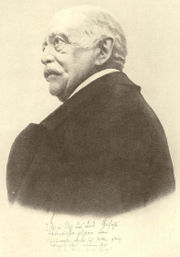
Despite this, a turn of events eventually led to his distancing from Wilhelm. Bismarck, feeling pressured and unappreciated by the Emperor and undermined by ambitious advisers, refused to sign a proclamation regarding the protection of workers along with Wilhelm, as was required by the German Constitution, to protest Wilhelm's ever increasing interference to Bismarck's previously unquestioned authority. Bismarck also worked behind the scenes to break the Continental labour council which on which Wilhelm had set his heart.
The final break came as Bismarck searched for a new parliamentary majority, with his Kartell voted from power due to the anti-socialist bill fiasco. The remaining forces in the Reichstag were the Catholic Centre Party and the Conservative Party. Bismarck wished to form a new block with the Centre Party, and invited Ludwig Windthorst, the parliamentary leader to discuss an alliance. This would be Bismarck's last political manoeuvre. Wilhelm was furious to hear about Windthorst's visit. In a parliamentary state, the head of government depends on the confidence of the parliamentary majority, and certainly has the right to form coalitions to ensure his policies a majority. However, in Germany, the Chancellor depended on the confidence of the Emperor alone, and Wilhelm believed that the Emperor had the right to be informed before his minister's meeting. After a heated argument in Bismarck's office Wilhelm, whom Bismarck had allowed to see a letter from Tsar Alexander III describing him as a "badly brought-up boy", stormed out, after first ordering the rescinding of the Cabinet Order of 1851, which had forbidden Prussian Cabinet Ministers to report directly to the King of Prussia, requiring them instead to report via the Prime Minister. Bismarck, forced for the first time into a situation he could not use to his advantage, wrote a blistering letter of resignation, decrying Wilhelm's interference in foreign and domestic policy, which was only published after Bismarck's death. As it turned out, Bismarck became the first victim of his own creation, and when he realized that his dismissal was imminent:
- All Bismarck’s resources were deployed; he even asked Empress Frederick to use her influence with her son on his behalf. But the wizard had lost his magic; his spells were powerless because they were exerted on people who did not respect them, and he who had so signally disregarded Kant’s command to use people as ends in themselves had too small a stock of loyalty to draw on. As Lord Salisbury told Queen Victoria: 'The very qualities which Bismarck fostered in the Emperor in order to strengthen himself when the Emperor Frederick should come to the throne have been the qualities by which he has been overthrown.' The Empress, with what must have been a mixture of pity and triumph, told him that her influence with her son could not save him for he himself had destroyed it.
Bismarck resigned at Wilhelm II's insistence in 1890, at age 75, to be succeeded as Chancellor of Germany and Minister-President of Prussia by Leo von Caprivi. Bismarck was discarded ("dropping the pilot" in the words of the famous Punch cartoon), promoted to the rank of "Colonel-General with the Dignity of Field Marshal" (so-called because the German Army did not appoint full Field Marshals in peacetime) and given a new title, Duke of Lauenburg, which he joked would be useful when travelling incognito. He was soon elected as a National Liberal to the Reichstag for Bennigsen's old and supposedly safe Hamburg seat, but was embarrassed by being forced to a second ballot by a Social Democrat rival, and never actually took up his seat. He entered into restless, resentful retirement to his estates at Varzin (in today's Poland). Within one month after his wife died on 27 November 1894, he moved to Friedrichsruh near Hamburg, waiting in vain to be petitioned for advice and counsel.
As soon as he had to leave his office, citizens started to praise him, collecting money to build monuments like the Bismarck Memorial or towers dedicated to him. Much honour was given to him in Germany, many buildings have his name, books about him were best-sellers, and he was often painted, e.g., by Franz von Lenbach and C.W. Allers.
Bismarck spent his final years gathering his memoirs (Gedanken und Erinnerungen, or Thoughts and Memories), which criticized and discredited the Emperor. He died in 1898 (at the age of 83) at Friedrichsruh, where he is entombed in the Bismarck-Mausoleum. He was succeeded as Fürst von Bismarck-Schönhausen by Herbert.
On his Gravestone it is written "Loyal German Servant of Kaiser William I".
Last warning and prediction
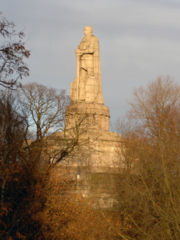
In December 1897, Wilhelm II visited Bismarck for the last time. Bismarck again warned the Kaiser about the dangers of improvising government policy based on the intrigues of courtiers and militarists. Bismarck’s last warning was:
"Your Majesty, so long as you have this present officer corps, you can do as you please. But when this is no longer the case, it will be very different for you."
– Alan Palmer, Bismarck, Charles Scribner’s Sons (1976) p. 267]
Subsequently, Bismarck made these accurate predictions:
" Jena came twenty years after the death of Frederick the Great; the crash will come twenty years after my departure if things go on like this" ― a prophecy fulfilled almost to the month.
– A.J.P. Taylor, Bismarck, Alfred A Knopf, New York (1969) p. 264]
Bismarck’s social legislation
„[...] the actual complaint of the worker is the insecurity of his existence; he is unsure if he will always have work, he is unsure if he will always be healthy and he can predict that he will reach old age and be unable to work. If he falls into poverty, and be that only through prolonged illness, he will find himself totally helpless being on his own, and society currently does not accept any responsibility towards him beyond the usual provisions for the poor, even if he has been working all the time ever so diligently and faithfully. The ordinary provisions for the poor, however, leaves a lot to be desired [...].“
– Otto von Bismarck, 20.03.1884
The 1880s were a period when Germany started on its long road towards the welfare state it is today. The Social Democratic, National Liberal and Centre parties were all involved in the beginnings of social legislation, but it was Bismarck who established the first practical aspects of this program. The program of the Social Democrats included all of the programs that Bismarck eventually implemented, but also included programs designed to preempt the programs championed by Karl Marx and Fredrick Engels. Bismarck’s idea was to implement the minimum aspects of these programs that were acceptable to the German government without any of the overtly Socialistic aspects.
Bismarck opened debate on the subject on 17 November 1881 in the Imperial Message to the Reichstag, using the term applied Christianity to describe his program. In 1881 Bismarck had also referred to this program as Staatssozialismus, when he made the following accurate prediction to a colleague:
- "It is possible that all our politics will come to nothing when I am dead but state socialism will drub itself in. (Der Staatssozialismus paukt sich durch.)"
Bismarck’s program centered squarely on insurance programs designed to increase productivity, and focus the political attentions of German workers on supporting the Junker's government. The program included Health Insurance; Accident Insurance (Workman’s Compensation); Disability Insurance; and an Old-age Retirement Pension, none of which were then currently in existence to any great degree.
Based on Bismarck’s message, The Reichstag filed three bills designed to deal with the concept of Accident insurance, and one for Health Insurance. The subjects of Retirement pensions and Disability Insurance were placed on the back burner for the time being.
Health Insurance Bill of 1883
The first bill that had success was the Health Insurance bill, which was passed in 1883. The program was considered the least important from Bismarck’s point of view, and the least politically troublesome. The program was established to provide health care for the largest segment of the German workers. The health service was established on a local basis, with the cost divided between employers and the employed. The employers contributed 1/3rd, while the workers contributed 2/3rds . The minimum payments for medical treatment and Sick Pay for up to 13 weeks were legally fixed. The individual local health bureaus were administered by a committee elected by the members of each bureau, and this move had the unintended effect of establishing a majority representation for the workers on account of their large financial contribution. This worked to the advantage of the Social Democrats who – through heavy Worker membership – achieved their first small foothold in public administration.
Accident Insurance Bill of 1884
Bismarck’s government had to submit three draft bills before they could get one passed by the Reichstag in 1884. Bismarck had originally proposed that the Federal Government pay a portion of the Accident Insurance contribution. Bismarck’s motive was a demonstration of the willingness of the German government to lessen the hardship experienced by the German workers as a means of weaning them away from the various left-wing parties, most importantly the Social Democrats. The National Liberals took this program to be an expression of State Socialism, which they were dead set against. The Centre party was afraid of the expansion of Federal Power at the expense of States Rights. As a result, the only way the program could be passed at all was for the entire expense to be underwritten by the Employers. To facilitate this, Bismarck arranged for the administration of this program to be placed in the hands of “Der Arbeitgeberverband in den beruflichen Korporationen”, which translates as “The organization of employers in occupational corporations”. This organization established central and bureaucratic insurance offices on the Federal, and in some cases the State level to perform the actual administration. The program kicked in to replace the health insurance program as of the 14th week. It paid for medical treatment and a Pension of up to 2/3rds of earned wages if the worker was fully disabled. This program was expanded in 1886 to include Agricultural workers.
Old Age and Disability Insurance Bill of 1889
The Old Age Pension program, financed by a tax on workers, was designed to provide a pension annuity for workers who reached the age of 70 years. At the time, the life expectancy for the average Prussian was 45 years. Unlike the Accident Insurance and Health Insurance programs, this program covered Industrial, Agrarian, Artisans and Servants from the start. Also, unlike the other two programs, the principle that the Federal Government should contribute a portion of the underwriting cost, with the other two portions prorated accordingly, was accepted without question. The Disability Insurance program was intended to be used by those permanently disabled. This time, the State or Province supervised the programs directly.
Legacy
Bismarck's most important legacy is the unification of Germany. Germany had existed as a collection of hundreds of separate principalities and Free Cities since the formation of the Holy Roman Empire. Over the next thousand years various kings and rulers had tried to unify the German states without success until Bismarck. Largely as a result of Bismarck's efforts, the various German kingdoms were united into a single country. Following unification, Germany became one of the most powerful nations in Europe. Bismarck's astute, cautious, and pragmatic foreign policies allowed Germany to retain peacefully the powerful position into which he had brought it; maintaining amiable diplomacy with almost all European nations. France, the main exception, was devastated by Bismarck's wars and his harsh subsequent policies towards it; France became one of Germany's most bitter enemies in Europe. Austria, too, was weakened by the creation of a German Empire, though to a much lesser extent than France. Bismarck's diplomatic feats were accidentally undone, however, by Kaiser Wilhelm II, whose policies unified other European powers against Germany in time for World War I.
In British writing (eg. the biographies by Taylor, Palmer or Crankshaw) Bismarck is often seen as an ambivalent figure, undoubtedly a man of great skill but who left no lasting system in place to guide successors less skilled than himself. It is often argued by such historians that his unification of Germany by force of arms, arresting of the development of liberal parliamentary rule in Prussia and diplomacy of secret treaties set Germany and Europe on the path to the First World War and ultimately the Third Reich.
During most of his nearly 30 year-long tenure, Bismarck held undisputed control over the government's policies. He was well supported by his friend Albrecht von Roon, the war minister, as well as the leader of the Prussian army Helmuth von Moltke. Bismarck's diplomatic moves relied on a victorious Prussian military, and these two people gave Bismarck the victories he needed to convince the smaller German states to join Prussia.
Bismarck took steps to silence or restrain political opposition, as evidenced by laws restricting the freedom of the press, the Kulturkampf, and the anti-socialist laws. His king (later Emperor) Wilhelm I rarely challenged the Chancellor's decisions; on several occasions, Bismarck obtained his monarch's approval by threatening to resign. However, Wilhelm II intended to govern the country himself, making the ousting of Bismarck one of his first tasks as Kaiser. Bismarck's successors as Chancellor were much less influential, as power was concentrated in the Emperor's hands.
Two ships of the German Imperial Navy ( Kaiserliche Marine), as well as the German battleship Bismarck from the World War II-era, were named after him.
Numerous statues and memorials dot the cities, towns, and countryside of Germany, including numerous Bismarck towers on four continents, and the famous Bismarck Memorial in Berlin. The only memorial showing him as a student at Göttingen University (together with his dog Ariel) and as a member of his Corps Hannovera was re-erected in 2006 at the Rudelsburg. The gleaming white The Bismarck-Denkmal (German for Bismarck monument) is a monument in the city of Hamburg. It stand in the centre of the St. Pauli district. Built in 1906, it is the largest and probably most well-known memorial to Bismarck world-wide.
Documentaries
- Bismarck - Chancellor and Demon, a two-part German documentary from 2007 which sheds light on Bismarck's contradictory personality. Written and directed by Christoph Weinert.
Place names
- Bismarck Archipelago, near the former German colony of New Guinea
- Bismarck, Illinois
- Bismarck, North Dakota, a city and state capital in the United States.
- Bismarck Sea
Titles from birth to death
- 1865- 30 July 1898: High Born Count Otto of Bismarck-Schönhausen
- 1871- 30 July 1898: His Serene Highness The Prince of Bismarck
- 1890- 30 July 1898: His Serene Highness The Prince of Bismarck, Duke of Lauenburg
